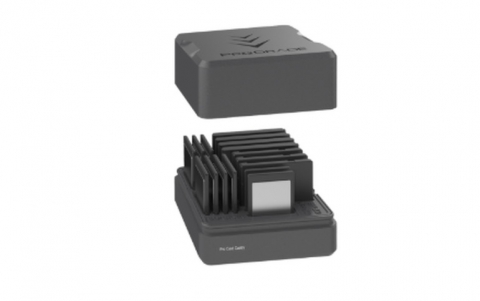
Microsoft Antitrust Final Judgment Expired
The U.S. Department of Justice issued a statement today marking the official expiration of the final judgment the department obtained as part of its historic Microsoft antitrust case.
Microsoft's legal battle ended on Thursday as court oversight of Microsoft expired with little or no fanfare.
In 1998, the department and attorneys general for 19 states plus the District of Columbia, filed suit against Microsoft alleging violation of the antitrust laws. The core allegation in the original lawsuit, upheld by the U.S. Court of Appeals in June 2001, was that Microsoft had unlawfully maintained its monopoly in PC operating systems by excluding competing middleware that posed a nascent threat to the Windows operating system. Specifically, the court of appeals upheld the district court?s conclusion that Microsoft engaged in unlawful exclusionary conduct by using contractual provisions to prohibit computer manufacturers from supporting competing middleware products on Microsoft?s operating system, prohibiting consumers and computer manufacturers from removing access to Microsoft's middleware products in the operating system, and reaching agreements with software developers and third parties to exclude or impede competing middleware products.
Certain provisions in the Microsoft final judgment expired in November 2007. Other provisions relating to Microsoft's obligation to make certain interoperability information available to third parties have twice been extended with Microsoft?s consent. "As these issues have now been resolved, it is appropriate for the final judgment to expire," the Department said in a statement.
The Department of Justice Antitrust Division claims that its efforts in the Microsoft case and final judgment have changed the competitive landscape allowing the marketplace to "operate in a fair and open manner bringing about increased innovation and more choices for consumers."
The Microsoft final judgment, which has been in effect since 2002, was designed to "eliminate Microsoft's illegal practices, to prevent recurrence of the same or similar practices and to restore the potential for competition from software products known as "middleware." To that end, the judgment protected the development and distribution of middleware - including web browsers, media players and instant messaging software - thereby increasing choices available to consumers," the Department's statement reads.
The Department said that the final judgment "proved effective in protecting the development and distribution of middleware products and prevented Microsoft from continuing the type of exclusionary behavior that led to the original lawsuit."
Microsoft no longer dominates the computer industry as it did when the complaint was filed in 1998. Nearly every desktop middleware market, from web browsers to media players to instant messaging software, is more competitive today than it was when the final judgment was entered.
And while Microsoft is no longer a feared monopoly or leading edge innovator, it seems that Microsoft wants Google to be regulators' next focus. The company has been trying to paint Google as the next logical target for regulators. The company has publicly called into question the fairness of Google's website ranking system and has urged website owners to complain to regulators. Microsoft has also made a formal complaint to antitrust regulators in Europe, where Google is already under investigation by the European Commission.
In 1998, the department and attorneys general for 19 states plus the District of Columbia, filed suit against Microsoft alleging violation of the antitrust laws. The core allegation in the original lawsuit, upheld by the U.S. Court of Appeals in June 2001, was that Microsoft had unlawfully maintained its monopoly in PC operating systems by excluding competing middleware that posed a nascent threat to the Windows operating system. Specifically, the court of appeals upheld the district court?s conclusion that Microsoft engaged in unlawful exclusionary conduct by using contractual provisions to prohibit computer manufacturers from supporting competing middleware products on Microsoft?s operating system, prohibiting consumers and computer manufacturers from removing access to Microsoft's middleware products in the operating system, and reaching agreements with software developers and third parties to exclude or impede competing middleware products.
Certain provisions in the Microsoft final judgment expired in November 2007. Other provisions relating to Microsoft's obligation to make certain interoperability information available to third parties have twice been extended with Microsoft?s consent. "As these issues have now been resolved, it is appropriate for the final judgment to expire," the Department said in a statement.
The Department of Justice Antitrust Division claims that its efforts in the Microsoft case and final judgment have changed the competitive landscape allowing the marketplace to "operate in a fair and open manner bringing about increased innovation and more choices for consumers."
The Microsoft final judgment, which has been in effect since 2002, was designed to "eliminate Microsoft's illegal practices, to prevent recurrence of the same or similar practices and to restore the potential for competition from software products known as "middleware." To that end, the judgment protected the development and distribution of middleware - including web browsers, media players and instant messaging software - thereby increasing choices available to consumers," the Department's statement reads.
The Department said that the final judgment "proved effective in protecting the development and distribution of middleware products and prevented Microsoft from continuing the type of exclusionary behavior that led to the original lawsuit."
Microsoft no longer dominates the computer industry as it did when the complaint was filed in 1998. Nearly every desktop middleware market, from web browsers to media players to instant messaging software, is more competitive today than it was when the final judgment was entered.
And while Microsoft is no longer a feared monopoly or leading edge innovator, it seems that Microsoft wants Google to be regulators' next focus. The company has been trying to paint Google as the next logical target for regulators. The company has publicly called into question the fairness of Google's website ranking system and has urged website owners to complain to regulators. Microsoft has also made a formal complaint to antitrust regulators in Europe, where Google is already under investigation by the European Commission.





















